In most cases, a funeral eulogy and obituary are used at the same time, and in some cases to mean the same thing, though there is a slight difference between them. The former refers to a speech that is laudable and is often congratulatory to the departed. In other words, it a memorial that is used to pay tribute to the life lived by the deceased. The latter on the other hand is a notice of the death of someone. There are times when it usually has a short biography of the deceased. This clearly points out that they both have different writing formats.
According to the funeral director Auckland, when writing an obituary you should seek to demonstrate honor and respect to the departed, while at the same time notifying those who have remained of the death. There are two basic types of obituaries; the short and concise or the long and more detailed. The former often requires that you include the following information: Name in full, Residence, Place of birth, Date of death and plans for internment and memorial. The longer one should have the aforementioned information together with circumstances under which the deceased died, plans for body viewing, jobs held, religious affiliation and any organization to which the deceased belonged. A picture may or may not be used and the language should be short and concise.
Remember that a funeral obituary is often paid for in case it is to be placed in a local daily. This means that when writing you should you should bear into account the length, about both payment and restrictions from given dailies.
When writing a eulogy on the other hand, you need to bear in mind that in a funeral you need not be a novelist. According to the funeral service Auckland, it is supposed to convey your feelings. The writing therefore has to be conversational and informal. When writing, you need to examine all the moments and feelings you and the deceased shared. Remember to include the deceased’s favorite poems, lines from songs and scripture verses among other literature excerpts that the deceased liked.
When writing a eulogy you should try being honest and truthful, such that you focus on the deceased’s positive qualities. If at all humor fits the deceased’s personality, then it is allowed. Brevity should also be given priority, though verification with the funeral director helps solve the time issue. If the time allocated for eulogizing the deceased is enough, you can then come up with a longer piece. Since in most cases the eulogy writer is the one who ends up reading it, you have to make sure that you know the meanings of words well. Ambiguity in the type of words used can only end up sending wrong signals.
Both documents are meant to pay last respects to the deceased. This therefore implies that they need careful creation. Following the above guidelines, you are certain of coming up with the best. The style of writing in both cases should not only be conversational, but also convey the feeling of the moment. The style of writing needs to be coherent and simple. Vocabularies are not preferred here since it is not a grammar contest.
Want my FREE guide to writing the perfect Eulogy and Obituary? Get it at Funeral Directors Auckland: [https://www.quickfuneral.com/beta]
Funeral Program Templates
-
Searching for a White Roses And Black Ribbon Funeral Program Template that is easy to print and has a cutting-edge look? White Roses And Black Ribbon Funeral Program Template is the Perfect decision because it measures 8.5”x 11”.
- No Limitation on Content, Edit anything
- Edit anytime – unlimited revisions even after purchased
- Get a printable PDF downloaded to get it printed on your own
-
Searching for a Realistic Burning Candle Funeral Program Template that is easy to print and has a cutting-edge look? Realistic Burning Candle Funeral Program Template is the Perfect decision because it measures 8.5”x 11”.
- No Limitation on Content, Edit anything
- Edit anytime – unlimited revisions even after purchased
- Get a printable PDF downloaded to get it printed on your own
-
Searching for a Bulltongue Arrowhead Funeral Program Template that is easy to print and has a cutting-edge look? Bulltongue Arrowhead Funeral Program Template is the Perfect decision because it measures 8.5”x 11”.
- No Limitation on Content, Edit anything
- Edit anytime – unlimited revisions even after purchased
- Get a printable PDF downloaded to get it printed on your own
-
Searching for a Grey Floral White Tiny Flower Funeral Program Template that is easy to print and has a cutting-edge look? Grey Floral White Tiny Flower Funeral Program Template is the Perfect decision because it measures 8.5”x 11”.
- No Limitation on Content, Edit anything
- Edit anytime – unlimited revisions even after purchased
- Get a printable PDF downloaded to get it printed on your own
-
Searching for a Red Flower Dark Soil Funeral Program Template that is easy to print and has a cutting-edge look? Red Flower Dark Soil Funeral Program Template is the Perfect decision because it measures 8.5”x 11”.
- No Limitation on Content, Edit anything
- Edit anytime – unlimited revisions even after purchased
- Get a printable PDF downloaded to get it printed on your own
-
Searching for a Pink Rose Frame Floral Oval Badge Funeral Program Template that is easy to print and has a cutting-edge look? Pink Rose Frame Floral Oval Badge Funeral Program Template is the Perfect decision because it measures 8.5”x 11”.
- No Limitation on Content, Edit anything
- Edit anytime – unlimited revisions even after purchased
- Get a printable PDF downloaded to get it printed on your own
-
Searching for a Brown and White Classic Funeral Program Template that is easy to print and has a cutting-edge look? Brown and White Classic Funeral Program Template is the Perfect decision because it measures 8.5”x 11”.
- No Limitation on Content, Edit anything
- Edit anytime – unlimited revisions even after purchased
- Get a printable PDF downloaded to get it printed on your own
-
Searching for a Purple Elegant Watercolor Funeral Program Template that is easy to print and has a cutting-edge look? Purple Elegant Watercolor Funeral Program Template is the Perfect decision because it measures 8.5”x 11”.
- No Limitation on Content, Edit anything
- Edit anytime – unlimited revisions even after purchased
- Get a printable PDF downloaded to get it printed on your own
-
Searching for a Cream and Green Photo Obituary Program that is easy to print and has a cutting-edge look? Cream and Green Photo Obituary Program is the Perfect decision because it measures 8.5”x 11”.
- No Limitation on Content, Edit anything
- Edit anytime – unlimited revisions even after purchased
- Get a printable PDF downloaded to get it printed on your own
-
Searching for a Cream Simple Elegant Photo Church Program that is easy to print and has a cutting-edge look? Cream Simple Elegant Photo Church Program is the Perfect decision because it measures 8.5”x 11”.
- No Limitation on Content, Edit anything
- Edit anytime – unlimited revisions even after purchased
- Get a printable PDF downloaded to get it printed on your own
-
Searching for a Grey Classic Minimalist Funeral Program Template that is easy to print and has a cutting-edge look? Grey Classic Minimalist Funeral Program Template is the Perfect decision because it measures 8.5”x 11”.
- No Limitation on Content, Edit anything
- Edit anytime – unlimited revisions even after purchased
- Get a printable PDF downloaded to get it printed on your own
-
Searching for a White Classic Funeral Program Template that is easy to print and has a cutting-edge look? White Classic Funeral Program Template is the Perfect decision because it measures 8.5”x 11”.
- No Limitation on Content, Edit anything
- Edit anytime – unlimited revisions even after purchased
- Get a printable PDF downloaded to get it printed on your own


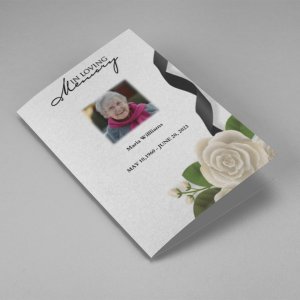
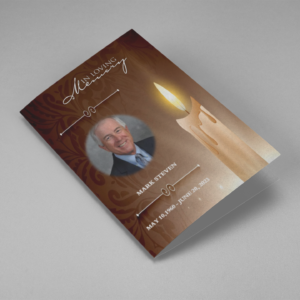
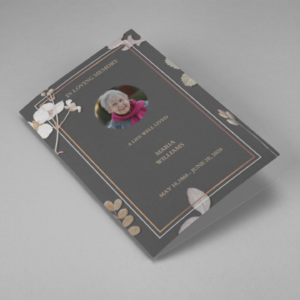
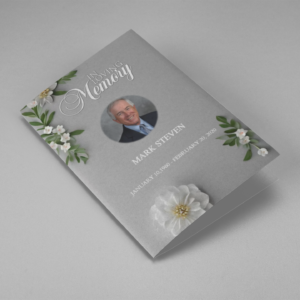
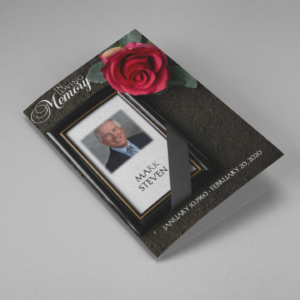
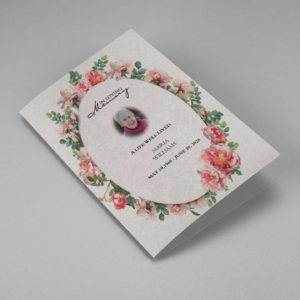
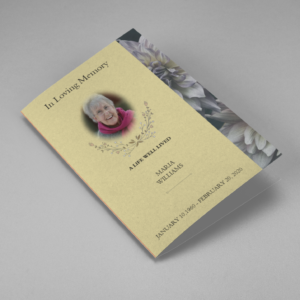
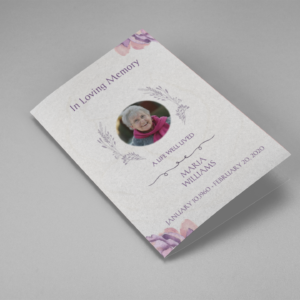
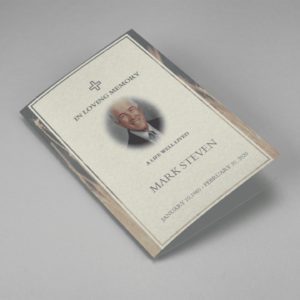
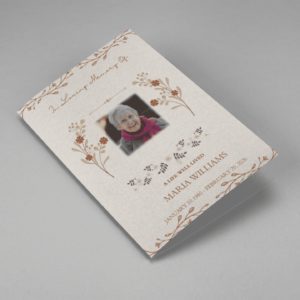
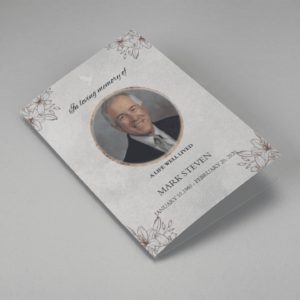
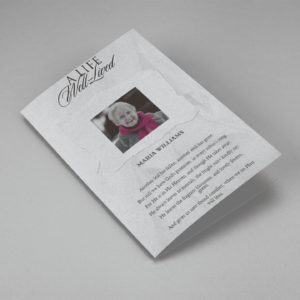
Leave a Reply
You must be logged in to post a comment.